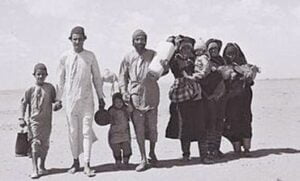
From the 1940s until the 1970s, and heightening with the founding of Israel in 1948, nearly 1-million Jews were expelled from their homes across Arab countries such as Iraq, Syria, Lebanon, Egypt, Yemen, Libya, Algeria and Iran.
In Egypt, the government arrested and charged Jews with being part of Zionist or Communist plots. They seized Jewish assets, businesses and property valued at $2.5 billion (U.S.) and set fire to the Jewish quarters in Cairo and Alexandria. In Syria, the Jewish community (which also dates back to Biblical times) was subjected to abuse and draconian laws. According to historian Martin Gilbert, Jews were “ forbidden to own radios or telephones, or to maintain postal contact with the outside world” and all Jewish properties were “confiscated by the state when the owners died.”
Jews were frequently subjected to pogroms, systemic violence and religious persecution. Their exiles were largely attributable to Arab regimes increasing their hostility toward Jews because of the very existence of Israel.
In Iraq, Iran, Yemen, Lebanon, Libya, Algeria and Tunisia, similar measures were put into place at the direction of the Arab League to eliminate the Jewish presence on these lands.
Today, while stories abound of many Arab refugees, few are aware or even acknowledge this forgotten exodus of Jewish refugees. Only in Israel has Nov. 30, the day after the UN voted to approve the Jewish-Arab partition plan of Palestine, been marked to commemorate their plight.
As part of the commemoration of this tragic but little-known chapter in Jewish history, B’nai Brith Canada, together with community partners, have produced a series of videos chronicling the stories of some who endured the prejudice directed toward Jews in the Middle East during these decades, and who have since come to Canada.
Here is the first of a five-part series that we will release this week:
Part 1, EGYPT: Irene Beunavida
Egypt’s government applied physical and economic pressure on Jews to leave the country. In 1956-57, the government nationalized Jewish property, gaining assets totalling $2.5-billion. The Jewish community’s population dropped from 75,000 to 200 by the year 2000, consisting by then of mostly older people unable to travel.


